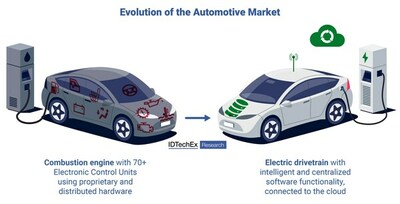IDTechEx Discusses How Tech Giants Could Displace Automotive OEMs
BOSTON, Jan. 19, 2024 -- The automotive market is a huge industry, and its evolution has spawned several giant corporations with many sub-brands, many of which are household names. However, the automotive industry is arguably undergoing the greatest technological shifts it has ever seen. Electrification, autonomous driving, and a shift to software-defined vehicles. With these trends well underway, is there space for companies often more associated with technology and consumer electronics to become a much bigger part of the automotive market and potentially start making cars themselves?
Electric cars are becoming a standard option with IDTechEx's "Electric Vehicles: Land, Sea, and Air 2024-2044" report expecting that over 23% of new cars registered in 2023 were electric (including hybrids), with battery-electric cars experiencing 4.8-fold growth between 2020 and 2023. Autonomous features have become increasingly common, with Level 2 autonomous vehicles now being the default, and Level 3 vehicles are now present on the road. Cars are becoming increasingly software-defined with the ability to provide updates over the air, subscriptions to new features, and create a new revenue stream for automotive OEMs. IDTechEx predicts in its "Connected and Software-Defined Vehicles 2024-2034: Markets, Forecasts, Technologies" report that software-related revenue for software-defined vehicles will exceed US$700 billion by 2034.
Historically, the automotive industry has not typically been quick to adapt, with development cycles that last several years and reliance on tier 1 and 2 suppliers. That is starting to change. Tesla managed to catch many off guard, bringing battery electric cars to the market in huge volumes, but also starting to change how many view car purchasing and ownership. Vehicles can be purchased directly online, servicing can be initiated remotely via an app, and new features and recalls can be carried out over the air. This is in stark contrast to the historic model, where everything is carried out at the car dealership, including updating navigation maps for a hefty fee.
These new approaches are now propagating across the industry and, at the same time, providing even greater opportunities for tech companies. In late 2023, Hyundai and Amazon launched a strategic partnership to sell vehicles on Amazon.com, and Sony entered a joint venture with Honda to leverage Sony's experience with AI, entertainment, and augmented reality. But as the automotive industry electrifies, and the combustion engine is no longer the defining feature, is it possible that this trend could go beyond tech companies providing the infotainment for an automotive OEM and start producing vehicles themselves?
The key challenge is that the two industries have very different strengths. This has been seen with some of the smaller startups that have attempted to enter into making cars, where the underlying technology is often state of the art, but the traditional aspects of manufacturing cars at high volumes with excellent quality control is where they have often struggled.
However, these challenges can be overcome with some of the major tech companies that are much better financed to set up the necessary manufacturing infrastructure and obtain the needed industry expertise. Huawei is partnering with several Chinese automotive OEMs to develop technology that goes into cars but also produces drive units for electric vehicles. Electronics manufacturer Foxconn (renowned for manufacturing Apple's iPhones) has started producing electric cars and aims to take 5% of the global electric vehicle market over the next few years. At the end of 2023, Chinese smartphone maker Xiaomi unveiled its first electric car with plans to become one of the top 5 global automakers. Several rumors of automotive projects from other major tech companies have suggested more could be seen coming to market over the coming years.
The question becomes, what is the more difficult route, an automotive OEM developing the technology required for the future consumer or tech giants developing the manufacturing skills needed for mass market automotive applications? The reality will likely lie somewhere between, where partnerships are sure to be a mainstay in the short term, but developments, acquisitions, and some displacement in the long term. One thing is certain: the automotive market has a huge evolution ahead of it in the coming years, with many significant challenges.
IDTechEx's market research portfolio includes reports on Future Automotive Technologies, Electric Vehicles: Land, Sea, and Air, and Connected and Software-Defined Vehicles. These reports take a deep dive into the market drivers, barriers, technologies, players, and markets for the future of the automotive market as well as other transport sectors. Comprehensive benchmarking is provided along with granular market forecasts. Sample pages are available to download for all IDTechEx reports.
About IDTechEx
IDTechEx guides your strategic business decisions through its Research, Subscription and Consultancy products, helping you profit from emerging technologies. For more information, contact [email protected] or visit www.IDTechEx.com.
Images download:
https://www.dropbox.com/scl/fo/ywlretsxmfq83czt0cdsk/h?rlkey=d7hp293dcfus0i60rmlbge4g3&dl=0
Media Contact:
Lucy Rogers
Sales and Marketing Administrator
[email protected]
+44(0)1223 812300
Social Media Links:
Twitter: www.twitter.com/IDTechEx
LinkedIn: www.linkedin.com/company/IDTechEx
Photo - https://mma.prnewswire.com/media/2319335/IDTechEx.jpg
Logo - https://mma.prnewswire.com/media/478371/IDTechEx_Logo.jpg
SOURCE IDTechEx



